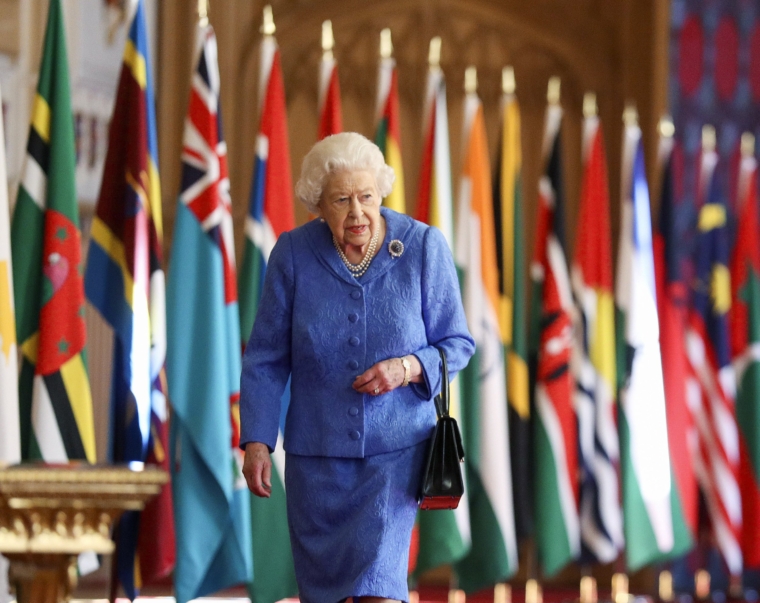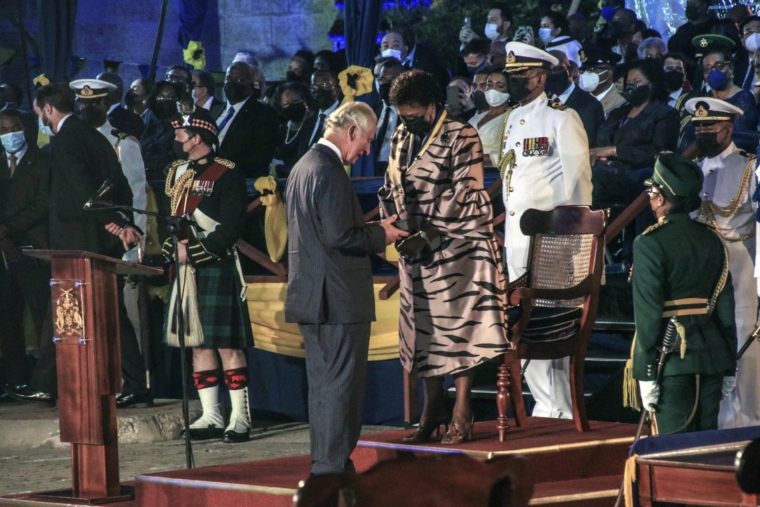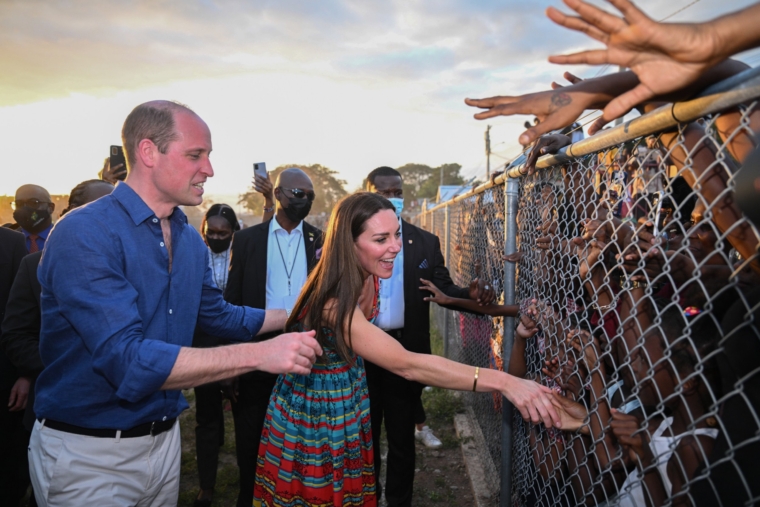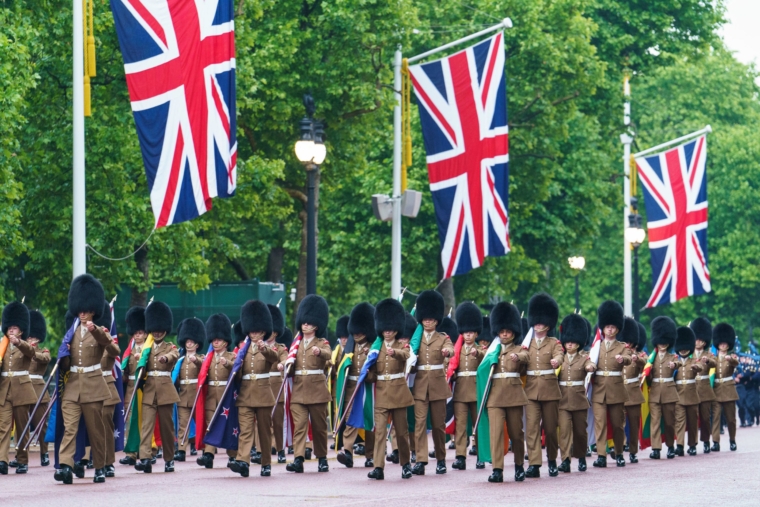Britain’s once vast empire is immortalised in the famous patriotic anthem Rule, Britannia!, a repurposed 18th century poem harking back to a time when the island nation ruled a quarter of the world.
It is likely to be belted out with pride by Brits across the UK during the Platinum Jubilee weekend, but for empire-turned-Commonwealth realms in the Caribbean, the line “Britons never, never, shall be slaves” adds to growing scrutiny over the empire’s colonial legacy.
Nations seeking redress for the slave trade by way of reparations are also demanding an apology from the royal family for its links to slavery, and to ultimately sever ties with the monarch in a move towards republicanism.

In Australia, anti-monarchy campaigners believe “a republic will happen” with the newly elected Prime Minister Anthony Albanese who has long supported the movement.
The Queen has been head of the Commonwealth since her father George VI’s death in 1952, with Prince Charles expected to take over after her long reign ends.
Of the 54 Commonwealth countries, she is head of state for 15 of them including Grenada, Jamaica and Australia.
The Caribbean
There have been six Caribbean countries that have recently indicated they plan to remove the Queen as their head of state – Belize, the Bahamas, Jamaica, Grenada, Antigua and Barbuda, and St. Kitts and Nevis, all countries that were once colonised by the British.
Arley Gill, chairman of the Grenada’s National Reparations Committee, said the royal family has lost its “relevance and significance” for Grenadian people.
When asked whether Charles ascending the throne will spark a republican movement in Grenada, Mr Gill repeated three times: “I think it would”.
Speaking from the capital St George’s, he told i: “I don’t think the Grenadian people are too enthused about Prince Charles.
“I don’t think the Prince will get a huge welcome when he ascends to the throne. I don’t think we are of that ilk.”
For several countries, such as Jamaica and Grenada, removing the monarch as head of state would first require a constitutional change, unlike Barbados, which became the region’s newest republic in November last year.

Barbados was able to remove the Queen as head of state and swear in its first president following a two-thirds majority vote in parliament, but in some other Caribbean nations a referendum would need to be held in order to bring about constitutional change.
It is something Mr Gill said the Grenadian population of about 110,000 are ready for.
Mr Gill, who works as a lawyer and is also Grenada’s ambassador to Caricom, the Caribbean community of 20 countries, said: “Speaking to ordinary people everyday, they have no reservations with removing the Queen as head of state. That’s the general mood.”
The problem, however, is discouragement on a political level to make that happen, borne from two previous referendums on constitutional reforms that failed to get the two-thirds majority vote by the public in order to pass, Mr Gill said.
He believes that the major political parties in Grenada are in favour of going republic – especially during an election year as it is now – but that there is no bipartisan unity.
Royal links to slave trade
Britain’s involvement in the slave trade spanned more than two centuries, with the first slaving expedition led by John Hawkins in 1562. His expedition proved so profitable that Elizabeth I provided him with money and ships for his subsequent journeys and gave him a unique coat of arms bearing a bound slave.
The connections between the royal family and slavery continued with Charles II, who granted a charter to the Royal African Company in 1663, of which his brother King James II was a member. It was the moment the transatlantic slave trade officially began, with royal approval, in the English – later British – Empire.
It is estimated that between 1663 and the end of the 17th century, Britain had enslaved and transported more than 332,000 Africans across the Atlantic where the majority were forced to work on plantations producing sugar, tobacco and other crops for European consumers.
The company held a monopoly on the trade until 1698 and did not cease dealing in slaves until 1731.
Kensington Palace and Hampton Palace are among properties with connections to King William III, who was a part owner of the company.
“Politics in the Caribbean can be fickle on those issues,” he said.
“Sometimes with a referendum like this – which has nothing to do with the prime minister or government of the day – if the opposition sees an opportunity to throw a cheap blow then you may very well find the government will be hesitant to go forward with the referendum.
“Once there is a bipartisan position to remove the Queen, I believe that would be successful.”
More than 1,000 miles across the Caribbean Sea, republican fervour has also spread in Jamaica.
It is a conversation the country has had since at least the 90s, when a constitutional commission submitted its report to parliament recommending that Jamaica should become a republic.
Officials have since made promises to that effect. More recently, Prime Minister Andrew Holness suggested to the Duke of Cambridge during a royal tour in Jamaica in March this year that his country was “moving on” and that its future is “as an independent, developed, prosperous country”.
Prince William acknowledged after the trip that the monarchy’s days in the Caribbean may be numbered as he stated the future “is for the people to decide upon”.
Rosalea Hamilton, a civil rights campaigner and founding director of the nonprofit Institute of Law and Economics in Kingston, said that while the Jamaican government has yet to make good on its promises, this time it “will be different” as the nation celebrates 60 years of independence in August.
“After 60 years there’s a view that it is time to put the past behind in terms of these institutional legacies,” she told i.
Dr Hamilton is among dozens of campaigners who form the Advocates Network, a human rights coalition of activists, that is urging the Jamaican government to draft and table a legislative bill to parliament this year to begin the process of removing the Queen as sovereign.
Dr Hamilton said there is an expectation for this to happen ahead of Jamaican Independence Day in August, which could mean a referendum as early as next year.
However, campaigners argue that years of apathy among voters and a general acceptance of the status quo means removing the British monarch as head of state would, in and of itself, not make a fundamental difference to people’s lives.
While it may act as an important, symbolic gesture to remove the last vestiges of colonialism, it would have to be part of wider reforms that shifts sovereignty to the people of Jamaica, where they can actively engage in shaping decisions that affect their lives.
Maziki Thame, a senior lecturer at the University of the West Indies in Kingston, told i that Jamaicans “are at an impasse”.
“These become academic issues that don’t matter to everyday people,” she added.
“People are invested in their everyday survival, people are preoccupied with issues of – outside of economic survival – high levels of violence.”

She said if an opportunity for celebration arises “people take it”, pointing to the controversial pictures of William and Kate shaking hands with crowds behind a wire mesh fence during their trip in Jamaica.
Australia
Republican figures in Australia believe when Prince Charles ascends the throne it will reignite support to end constitutional ties with the British monarchy.
“With the end of the Queen’s reign drawing closer, Australians are saying enough is enough – it’s time to move on,” said Sandy Biar, national director of the Australian Republican Movement (ARM).
A survey by ABC News this month found that a majority of Australians – 53 per cent – did not support Prince Charles becoming King of Australia.
ARM has even come up with a plan – called the choice model – to elect a new head of state after surveying thousands of people.
Professor Anne Twomey, a constitutional law expert at the University of Sydney, said a republican movement has existed in Australia as far back as the 1890s, and has been stronger than in other countries such as Canada and New Zealand.
Speaking at an event hosted by the School of Advanced Study last week, she said the difficulties Australia faced when it last held a republic referendum in 1993 are the same as they are now, namely the question of who would replace the monarch as head of state.
There was the added issue of voters not knowing or being unsure of how government works, with the mantra “Don’t know? – Vote ‘No’” by opposers of the 1999 referendum proving “extremely successful”, Professor Twomey said. In the end, 55 per cent of voters decided to stick with the status quo.
There is also a debate to prioritise the recognition of Australia’s indigenous population in the constitution, which currently makes no reference to original inhabitants whose leaders suffered injustices for generations after European colonisation in the 1700s.

“The principal appetite for constitutional change is for First Nations Australians to have their rights embedded in the constitution, and that that should take precedence over becoming a republic,” Dr Sue Onslow, director of the Institute of Commonwealth Studies at the University of London, told i.
It is also something the Republic movement recognised when it welcomed Mr Albanese as Australia’s Prime Minister earlier this month. “Won’t be a referendum just yet as they’re rightly committed to first recognising Aboriginal people as the original Australians in the constitution. But a republic will happen,” the group tweeted.
What next?
Barbados’ Prime Minister Mia Mottley, who was re-elected with a landslide victory in January, was able to cut ties with the monarchy because she had the political and constitutional space to do so.
But questions remain of what happens next in terms of choosing President Sandra Mason’s successor.
How and who to choose as the president of a republic can be problematic. Dr Onslow said people may well be wary when former politicians take on the ceremonial presidential role: will they stick to their constitutional duties or “will there be meddling?”
Dr Onslow said the debate was tied up with the lack of trust in government institutions; elsewhere in the Caribbean, there have also been concerns around political malaise and lack of faith in institutions, and consequent worries of a low turnout should a referendum take place.
The necessary constitutional changes to become republics promised to be a lengthy and complicated process with multiple factors at play, Dr Onslow said, but she added that republicanism is an issue that “will certainly not go away”.

